
The Legislative Duma of Tomsk Oblast
October 30, 2014. 35th Session of the Legislative Duma of the 5th convocation
Speaker Oksana Kozlovskaya’s opened the session with her traditional address to the Duma deputies. Among other things she said the following.
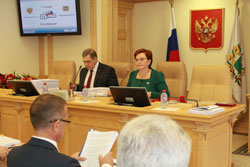 “The main subject item on the agenda today is the law on the Oblast budget for 2015-2017. Together with the Governor, we have already had a preliminary review of the three years’ budget and discussed many pertinent issues. Most important about the 2015-2017 budget is that it is balanced, guarantees delivery on all social commitments and secures investments in development initiatives.
“The main subject item on the agenda today is the law on the Oblast budget for 2015-2017. Together with the Governor, we have already had a preliminary review of the three years’ budget and discussed many pertinent issues. Most important about the 2015-2017 budget is that it is balanced, guarantees delivery on all social commitments and secures investments in development initiatives.
This budget is unique in utilizing a program oriented approach to 95% of all spending. It also provides an increase in payrolls of state financed organizations by almost 2bn rubles, with total spending of 23.5bn rubles (over 40% of the consolidated expenditures). The budget also includes increased spending on healthcare – an increase by over 1bn rubles. Overall spending on healthcare and education totals 23bn rubles. You must admit that with the rate of spending so high, the quality of services and efficiency of spending should be no less high. 2.6bn rubles will be spent to build, maintain and repair roads. 1.3bn rubles will be allocated to develop rural areas and upgrade agriculture. A third of all spending will be used to support municipal entities. 14% of all expenditure will be allocated to develop the real sector and provide investments.”
Summary of the Speaker’s speech.
HEALTHCARE BUDGET PASSED THE FIRST READING
The deputies passed in the first reading the bill On the budget of the Tomsk Oblast Territorial Compulsory Health Insurance Fund for 2015 and the planning period of 2016 and 2017.
13bn rubles are allocated for the territorial compulsory health insurance program (113% vs the 2014 budget). 75.6m rubles is allocated for the management functions of the Tomsk Oblast Territorial Compulsory Health Insurance Fund (105.4% vs the 2014 budget).
It is expected that the Fund’s 2015 budget will not have a deficit. Spending will be equal to revenue, 13bn rubles each. Compared to 2014, revenue and spending will grow by around 1.5bn rubles. All budgeted expenditure will be used to finance the territorial compulsory health insurance program. It is 1.5bn rubles more than in 2014 (112.9% vs 2014 budget).
PUBLIC CHAMBER HAS 1/3 OF MEMBERS APPROVED
By preferential voting the Oblast Duma deputies elected 14 members to the Public Chamber of Tomsk Oblast from the list of 22 candidates.
The Duma made its choice. Now the Governor and the municipal entities should elect 14 representatives each. The newly elected Public Chamber will work three years instead of two. This July the Oblast Duma increased its term by one year.
The Public Chamber was set up eight years ago with a purpose to promote civil society institutions in Tomsk Oblast, maintain democratic principles and facilitate communication between the public and the government on most important questions of social and economic development. The Regional Public Chamber represents the interests of around 1,500 public associations.
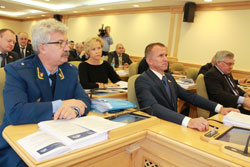 The goals of the Public Chamber of Tomsk Oblast are:
The goals of the Public Chamber of Tomsk Oblast are:
- Engage individuals and public associations in shaping and implementing the public policy and the activity of the local governments.
- Promote regionally important public initiatives on enforcing constitutional rights, freedoms, and legitimate interests of individuals and public associations.
- Provide public evaluation of socially important regional bills, drafts of legislative acts of Tomsk Oblast government bodies and, as upon prior agreement, drafts of legislative acts of local governing bodies.
- Develop recommendations for the government agencies of Tomsk Oblast for setting priorities in the government support of public and other associations of citizens which promote the development of the civil society in Tomsk Oblast.
- Engage individuals, public associations and media in discussing and developing recommendations on issues such as freedom of speech in the media, citizens’ right to distribute information by legal ways, guarantee of the freedom of speech and freedom of the media.
2014 BUDGET WAS INCREASED
The 2014 budget’s revenue and expenditure items were increased by 219.4m rubles. The deficit remains unchanged. The budget numbers went up through earmarked non-repayable receipts, including 219.3m rubles from the federal budget and 122,600 rubles from the Pension Fund of the Russian Federation.
With the adopted amendments the Oblast budget revenues in 2014 total 50.4bn rubles; expenditures 54.5bn rubles; and deficit 4.1bn rubles or 10.12% of the revenues without taking into account non-repayable receipts from the federal budget.
The total amount of spending on the investment and innovation activity in 2014 was increased by 127.4m rubles and now totals 6.5bn rubles (including funding from the federal budget of 1.3bn rubles).
The amendments were passed in two readings.
HEALTHCARE BUDGET ADJUSTED
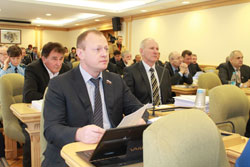 The deputies made changes to the budget of the Territorial Compulsory Health Insurance Fund of Tomsk Oblast. The total revenues of the Fund’s 2014 budget and the revenues dedicated to the territorial compulsory health insurance program did not change much.
The deputies made changes to the budget of the Territorial Compulsory Health Insurance Fund of Tomsk Oblast. The total revenues of the Fund’s 2014 budget and the revenues dedicated to the territorial compulsory health insurance program did not change much.
The following revenue items were amended.
- The deputies increased by 4.2m rubles receipts from fines for the compensation of damage from the abuse of misuse of funds. They now total 19.8m rubles.
- Non-tax revenues were increased by 2m rubles (interest on the balance of the current accounts of health insurance organizations).
- Revenues from investments of the idle cash of territorial compulsory health insurance funds were increased by 9.7m rubles (the total budgeted number for this item is 11.4m rubles).
- There will be a certain amount from balances of subsidies, subventions, and other earmarked interbudgetary transfers of previous years returned from the budgets of territorial funds.
The Fund’s budget also takes into account a 2.2m rubles payback to the budget of the Federal Compulsory Health Insurance Fund.
The following changes were made to the expenditure items.
- Pursuant to the Letter of the Ministry of Finance of the Russian Federation, the cost of the medical services under the territorial compulsory health insurance program will include a new component - transfers to other budgets in the budgeting system of the Russian Federation (applicable to interterritorial settlements) - of 131.5m rubles. This category of spending belongs to the regulated reserve.
- The portion of the regulated reserve allocated to pay for the treatment of people from other regions in the medical institutions of Tomsk Oblast was reduced by 16.8m rubles and is forecasted to total 145.3m rubles by the end of the year.
- The portion of the regulated reserve dedicated to securing financial sustainability was increased by 16.8m rubles and will total 196m rubles.
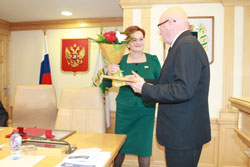 With its structure changed, the amount of the budgeted regulated reserve has not changed and totals 472.9m rubles.
With its structure changed, the amount of the budgeted regulated reserve has not changed and totals 472.9m rubles.
Spending on the Fund’s management functions was restructured in the following way.
- A new category of expenses - taxes, duties, and other payments - was singled out. The amount is 15,500 rubles.
- Pursuant to the decree of the Administration of Tomsk Oblast No. 458-ра , the cost category payments to employees to ensure fulfillment of functions by government (municipal) agencies, institutions, and public off-budget fund management bodies was increased by 920,700 rubles through savings on other purchases of goods and services for government (municipal) needs.
MUTUALLY BENEFICIAL COOPERATION
The deputies adopted in two readings amendments to two laws, which provide corporate property tax benefits to companies building nursery and secondary schools under public-private partnership arrangement.
The regional law provides a number of public-private partnership schemes where the title of ownership of created property belongs to the private partner until the public partner buys out the entire property. The private partner is obliged to pay the corporate property tax until they fully sell the property to the government.
This is the arrangement of the first public-private partnership project currently implemented in Tomsk Oblast:
- The private partner builds in 2014-2015 fifteen nursery schools.
- They invest own and borrowed capital.
- Until the facilities are commissioned, no related costs are included in the region’s budget.
- Once the property is commissioned, the municipal government buys it out by installments within five years.
- Within the buy-out period of five years the private partner makes the property available to the public partner on a gratuitous basis.
- Once the property is fully bought out, the private partner passes the title of ownership to the municipal entity.
Such an arrangement helped Tomsk Oblast to achieve the following goals.
- Expedite compliance with the Presidential Decree on 100% accessibility of preschool education before the end of 2015.
- Reduce the burden of the Oblast budget by distributing payments over 5 years and moving the final buy-out to 2016–2019.
The private partner fully discharges its obligations under the public-private partnership agreement once the facilities are commissioned. They do not intend to hold the title of ownership of newly built facilities. Their primary goal is to sell the property to the customer.
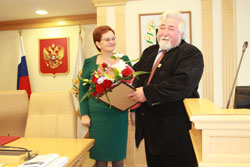 Giving Tomsk Oblast the opportunity to buy out property within five years, the private partner does a good favor to the region and proves its social responsibility.
Giving Tomsk Oblast the opportunity to buy out property within five years, the private partner does a good favor to the region and proves its social responsibility.
The amendments relieve of the corporate property tax construction companies which build facilities for preschool or school organizations under public-private partnership agreements.
THREE YEAR BUDGET PASSED THE FIRST READING
The deputies adopted in the first reading the draft budget for the next three years and approved the members of the Conciliation Committee.
For the first time the Oblast budget is built of earmarked amounts for specific programs. In 2015, 97% of the region’s expenditure will be distributed across 23 regional government programs.
The revenues will total:
- 43.2bn rubles in 2015
- 46.2bn rubles in 2016
- 45.8bn rubles in 2017
In 2015, tax and non-tax revenues will go up by 3.4bn rubles (8.9%). Key sources of budget revenue will again be corporate profit and property taxes, personal income tax, and excise taxes.
Non-repayable receipts from the federal budget are budgeted at 1.8bn rubles in 2015; 2.2bn rubles in 2016; and 3.3m rubles in 2017. Once the Russian State Duma passes in the first reading the federal law On the federal budget for 2015 and the planning period of 2016 and 2017, the budgeted amount of non-repayable receipts from the federal budget will be increased.
The expenditures will total:
- 47.3bn rubles in 2015
- 50.6bn rubles in 2016
- 52.7bn rubles in 2017
The deficit is budgeted at:
- 4.1bn rubles in 2015
- 4.4bn rubles in 2016
- 6.9bn rubles in 2017
The deficit will be covered mostly through public borrowing in the form of securities and bank loans. The budgeted deficit and national debt of Tomsk Oblast do not exceed the limits established by the Budget Code of the Russian Federation.
The Oblast budget retains its social dimension. More than 65% of the total expenditure will be spent on social and cultural activities annually.
SOCIAL TAXI AND PLANE TICKETS FOR CHILDREN WITH CANCER
The deputies added to the Oblast law On social support for physically challenged people in Tomsk Oblast articles which provide material aid to disabled children with cancer who need to travel by air to a place of medical treatment, and social taxi services for physically challenged individuals.
This right was provided by the Oblast law On social services for citizens in Tomsk Oblast which loses effect on January 1, 2015 upon adoption of a new law.
The 2015 budget of Tomsk Oblast allocates 2.8m rubles to finance the new law.
OVER 70M RUBLES ON HOUSING FOR FAMILIES WITH AT LEAST FIVE CHILDREN
The deputies made amendments to the law On special-purpose housing in Tomsk Oblast, which will help dozens of large families improve their living conditions. The amendments extend the period of registration for families with at least five children as families in need of housing.
The amendments require 72.9m rubles of additional allocations from the Oblast budget.
INDUSTRIAL VECTOR
The bill On industrial parks in Tomsk Oblast was reviewed in the first reading. The new law makes available government support for industrial park residents and investors, defines the roles and responsibilities of the Tomsk Oblast Administration, local governing bodies, and management companies of industrial parks.
Government discussions around the concept of industrial parks started in 2013. Industrial parks were conceived as platforms for the development of small and medium business, which would make Tomsk Oblast more attractive for investors.
The federal law does not give any definition to the notion of an industrial park. Subsequently, there is not a legal framework for such territories. Every region handles that in their own way.
The initiators of the Tomsk Oblast law on industrial parks propose that the Tomsk park will be an industrial site with all necessary utility networks, production, warehousing, and office facilities, and access ways. Industrial parks may be owned by the regional or municipal government agencies, or by private investors.
JOBS FOR THE DISABLED
The deputies adopted in the second reading the Oblast law On execution of authority in promoting employment in Tomsk Oblast which is intended to help physically challenged individuals get employed. The Oblast budget provides 332,200 rubles in 2014 and 213,700 rubles in 2015 to co-finance this initiative.
SOCIAL ASSISTANCE BENEFITS FOR PENSIONERS WITH LOW PENSIONS
The deputies passed in two readings the bill On subsistence minimum of a pensioner in Tomsk Oblast in 2015. This law is used for the calculation of the social assistance benefit for the retired persons whose pension falls below the established subsistence minimum. The subsistence minimum for 2015 is set at 7,144 rubles (vs 6,298 rubles in 2014).
The national subsistence minimum in 2015 will be 7,144 rubles. The social assistance benefit will be financed from the federal budget through territorial agencies of the Russian Pension Fund.
